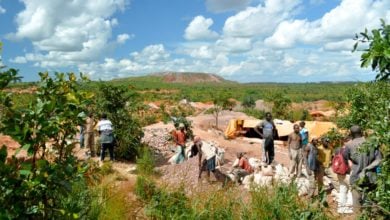African countries get little serious attention in the mainstream U.S. media. Workers’ struggles in Africa get even less.
|
Beginning March 3, 16,000 Swazi textile workers went out on strike demanding better pay and conditions. Workers face humiliating treatment from managers and owners and receive dismal wages. They are seeking a 12 percent raise.
Cynthia Ndwandwe, a mother of five, told a U.N. news agency, “My take-home pay is R300 (US$38) a fortnight.” A fortnight is two weeks.
The textile industry is the center of Swazi manufacturing. It has been paralyzed by the strike, prompting threats from factory owners. The bosses say they will fire workers if they do not immediately return to work.
Striking workers were subjected to beatings and tear gas from authorities at protests on March 3 and March 5 and at other smaller protests.
The workers have remained undaunted. Alex Fakudze, leader of the Swaziland Manufacturing and Allied Workers Union, told the Sunday Times, “Even if it means earning zero at the end of the month, we do not mind because we want what is due to us.”
Nurses in Swaziland have also protested low pay and working conditions. They face dismal wages, physical attacks and a lack of basic sanitary and medical equipment.
The main hospital in the capital, Mbabane, was declared unfit for human occupation earlier this year. Nurses have decided to work no overtime until conditions are improved in the country’s hospitals and clinics.
Swaziland and neo-colonialism
Swaziland is a perfect example of the extreme economic polarization wrought by colonialism and neo-colonialism.
The country is ruled by monarch King Mswati III. The king appoints the prime minister and all members of parliament.
The economy is dominated by the king and a small elite affiliated with the royal family. The king owns 60 percent of the land in the country and significant portions of the other 40 percent through the government and a company owned by the royal family.
Roughly 69 percent of the country lives in poverty. Most of those in rural areas are frequently ravaged by natural disaster, which creates widespread hunger. The International Monetary Fund reports that at least 25 percent of the population requires some sort of food assistance.
Swaziland suffers from the highest rate of HIV/AIDS in the world, with 38.6 percent of the population infected. As a result, life expectancy has fallen to 39 years of age.
While most agriculture is oriented toward subsistence, Swaziland has a sizable sugar industry. Coca-Cola’s concentrate production plant is located in the country. King Mswati frequently visits with the CEO of Coke in Atlanta.
The manufacturing sector is almost totally dominated by foreign investment capital. Swaziland is partner to the African Growth and Opportunity Act. AGOA is a “free trade” deal African countries have signed with the United States.
In most cases in Africa, there is no indigenous capital of any scale. Monopoly companies, mostly from Taiwan, open factories in the host country. They put labels such as “Made in Swaziland” on products and ship them to the United States for massive profits.
Swaziland’s government encourages Taiwanese investment in the textile sector, hoping to benefit from the overall economic boom. This arrangement boosts production for transnational corporations such as Wal-Mart, not for the Swazi people.
Under conditions such as these, both urban and rural workers will continue to struggle for improvements in their living standards and for the right to control the political destiny of their country.
Progressives in the United States should play close attention to the struggles waged by workers in Africa. They are fighting against tremendous poverty, government repression and the very same transnational corporations that workers are battling in the United States.






